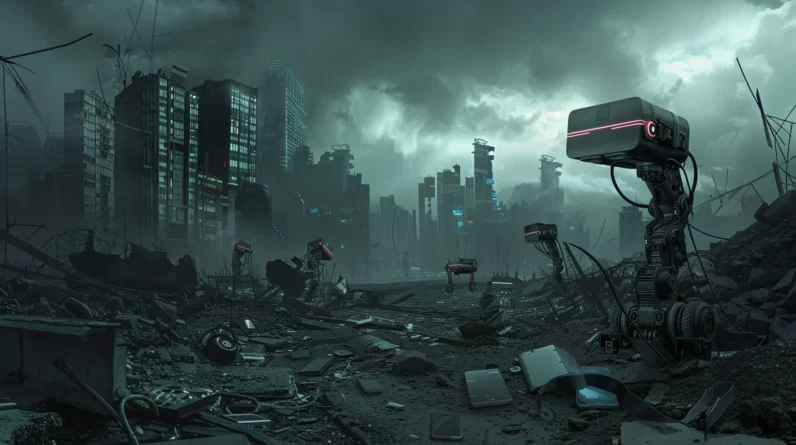
As we adopt new technologies, we’re confronting unprecedented social disruptions that threaten our well-being. Rising AI integration and automation may displace jobs, widen the economic gap, and strain healthcare resources. Environmental degradation worsens, and social inequality persists, further entrenching wealth disparities. Meanwhile, mental health issues surge, fueled by excessive screen time, digital addiction, and the pressure to curate a perfect online persona.
We’re facing a perfect storm of challenges that will reshape our collective experience. By examining these issues, we can better prepare ourselves for the future and uncover ways to mitigate its negative consequences.
Economic Uncertainty Ahead
As we stand at the threshold of an increasingly automated future, we’re forced to confront the uncomfortable reality that rising AI integration and automation in industries may lead to widespread job displacement and economic uncertainty for many of us. Projections show that certain sectors, like manufacturing, are at risk of job losses due to technological advancements. The gap between economic growth and job creation has widened, raising concerns about income inequality.
We’re witnessing rapid technological change that’s transforming the workforce, and it’s uncertain how the future job market will look. With robotics and automation advancing, we’re facing potential social disruptions that can’t be ignored. It’s crucial we address these concerns head-on to mitigate the impact of job displacement and economic uncertainty on our communities.
Healthcare Challenges Intensify
Nearly 50% of us will experience a chronic disease by 2025, adding to the already overwhelming burden on healthcare systems that are struggling to keep up with the demand for quality care. As technology advances, we’re facing unprecedented challenges in healthcare. Rising costs are making access to essential treatments more difficult, while chronic diseases put additional strain on already stretched resources. Limited resources for healthcare facilities hinder their ability to provide adequate care to growing patient populations.
Lack of access to quality healthcare exacerbates health disparities, negatively impacting our overall well-being. As we look to the future, it’s clear that these challenges will only intensify, underscoring the need for innovative solutions to ensure access to quality healthcare for all.
Environmental Degradation Worsens
We’re witnessing an unprecedented environmental crisis, with the very foundations of our planet’s ecosystems crumbling under the weight of human activities. Environmental degradation is worsening at an alarming rate, with deforestation rates accelerating and an estimated 18.7 million acres lost annually. This habitat destruction leads to biodiversity loss, exacerbating ecosystem risks. Air pollution from industrial activities and transportation contributes to over 4.2 million premature deaths globally each year, severely impacting human health.
Climate change effects have intensified, with rising global temperatures, sea levels, and extreme weather events posing significant risks to ecosystems and human populations. Water scarcity affects over 2 billion people, and natural disasters fueled by environmental degradation have become more frequent and severe. We must acknowledge the gravity of these issues and take immediate action to mitigate their devastating consequences.
Social Inequality Persists
Future technologies, touted as harbingers of progress, paradoxically exacerbate income inequality, entrenching disparities in wealth distribution that threaten to destabilize the very fabric of society. We’re seeing how limited access to advanced tech tools intensifies the digital divide, widening the gap between social classes. As a result, social mobility challenges arise, and those without tech skills or resources face barriers to economic advancement.
Technology-driven job displacement contributes to social inequality, affecting the employment prospects of various groups. Moreover, ongoing social disparities are highlighted as marginalized communities struggle to adapt to rapid technological changes. We must acknowledge that social inequality persists, and it’s our responsibility to address these issues to ensure a more equitable future for all.
Mental Health Issues Rise
As we increasingly surrender to the allure of screens and social media, a disturbing trend emerges: a significant spike in stress, anxiety, and depression that threatens to engulf our collective mental well-being. We’re witnessing a rise in mental health issues, particularly among younger generations, as social isolation and loneliness take hold. Excessive screen time and reduced face-to-face interactions are major contributors to this problem. Digital addiction is also on the rise, affecting our sleep patterns, self-esteem, and overall well-being.
The pressure to curate a perfect online persona fuels feelings of inadequacy and comparison, further exacerbating mental health concerns. It’s essential we acknowledge these consequences and take steps to mitigate the negative impact of technology on our mental health.
Digital Life’s Double Edge
While digital life beefs up our connection and commerce opportunities, it simultaneously poses significant threats to our health, mental well-being, and societal fabric. As we navigate the benefits of digital life, we must acknowledge its darker side. Experts warn that excessive digital use can lead to:
1. Cognitive losses: deficits in problem-solving skills and memory formation.
2. Anxiety inducement: increased stress and emotional turmoil.
3. Profit motives: manipulation through technology for financial gain.
4. Societal divisiveness: erosion of empathy and community bonds.
We must strike a balance between harnessing the power of digital life and protecting our well-being. By recognizing the potential pitfalls, we can mitigate the human toll of future tech and create a more sustainable, harmonious relationship with technology.
Workforce Transformation Looms
We’re facing a seismic shift in the workforce, where the relentless march of automation and advanced technologies is rewriting the rules of employment and forcing us to reexamine the very role of human workers. The rise of AI and robotics is reshaping decision-making processes, substituting human labor in many fields, and leading to significant job losses, particularly in manufacturing and clerical work. As digital technologies continue to advance, economists worry about the widening gap between economic growth and job creation.
The pressure on income inequality and job availability is expected to worsen, raising questions about the future necessity of human workers in the workforce. We must acknowledge the transformative impact of technological advancements on our workforce and prepare for the challenges that lie ahead.
Navigating Ethical Dilemmas
In our pursuit of technological advancements, we must confront the ethical dilemmas that accompany them, lest we sacrifice our values and principles on the altar of progress. As we navigate the complexities of future tech, we’re faced with crucial decisions that impact societal well-being and individual rights. To ensure responsible innovation, we must consider the following key aspects:
1. Data privacy: How do we protect user data from misuse and exploitation?
2. Algorithm bias: How do we prevent AI systems from perpetuating existing social inequalities?
3. AI decision-making: How do we ensure transparency and accountability in AI-driven decision-making processes?
4. Ethical frameworks: How do we establish and enforce guidelines that promote autonomy, accountability, and transparency in technology development?
Conclusion
As we careen into a future of unprecedented technological advancements, we’re staring down the barrel of a social crisis of epic proportions. The fabric of our society will be stretched to the breaking point, with economic uncertainty, healthcare challenges, environmental degradation, social inequality, mental health issues, and workforce transformations all converging like a perfect storm. We’ll be forced to confront the darkest corners of our collective psyche, and the very survival of our humanity will hang precariously in the balance.
Buckle up, folks, the future is about to get very, very real.







